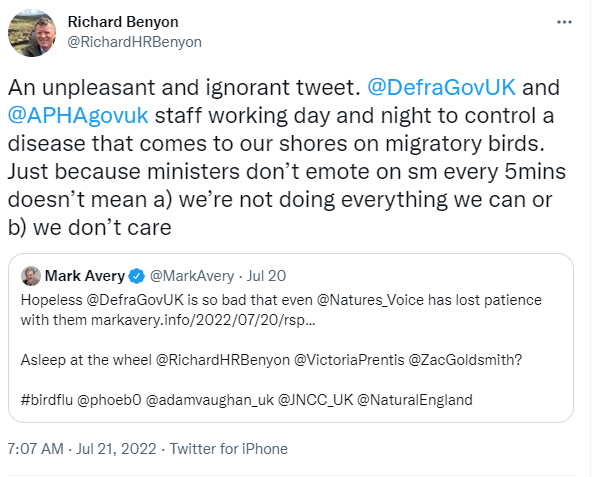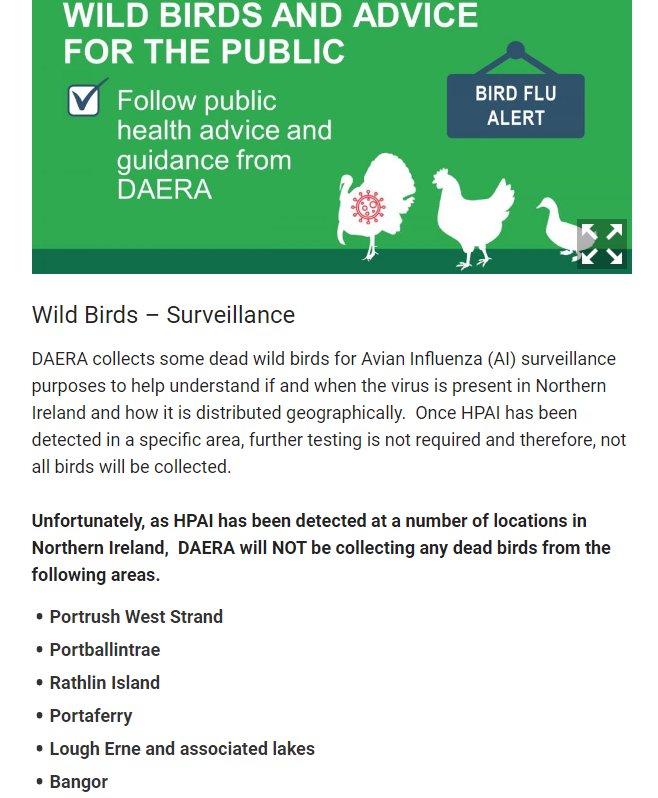Bird/Poultry flu.
A couple of days ago the RSPB sent out a strongly worded press release, which I reproduced here, which was entitled ‘Defra asleep at the wheel in bird flu emergency’.
I tweeted about it later that day:

I received a response from Richard Benyon himself:

It’s always good to have got a Minister’s attention so I followed up with a thread of tweets which I have edited down to this more readable version (but without editing the content);
Don’t shoot the messenger Richard. It’s the RSPB that thinks Defra is asleep at the wheel. Personally, I’m not sure that Defra knows where the wheel is…
But anyway, you sound rather defensive.
I was in an NGO meeting with Defra last week – have you had a report from that meeting? Defra seems to think that bird/poultry flu is solely an economic issue but it is now a conservation issue and could be a public health issue too. You, ministers, need much more understanding of the biology of the issue to be able to deal with any of those aspects.
Saying ‘wild birds’ over and over again doesn’t really do very much. Which wild birds? The Defra statement at the end of yesterday’s Guardian piece is hardly the response of a department on top of the subject.
What is Defra’s view on the current situation? For poultry, for conservation and for public health?
What is Defra’s view of the future scenarios – for poultry, for conservation and for public health?
Your surveillance is only of dead birds – isn’t it? And a very limited range of species.
How do you think that Roseate Terns got bird flu on Coquet Island? They came back to the UK in May after spending the winter off West Africa. Bit puzzling isn’t it?
As a biologist I’d be looking at gulls in more detail – what do your experts say?
- that meeting with Defra: a group of NGOs did have an online meeting with Defra a while ago – we had been seeking a meeting for a long time. I won’t comment on the content of the meeting except to say that if I had full confidence in Defra I wouldn’t still be banging on about their position. And I presume we can take it that the RSPB feel the same since their press release said what it did.
- the Defra response to the Guardian piece is a non-response. It indicates no grasp of what is happening and no indication of any action they are taking. It’s a 73-word version of ‘No comment’. It may be true that there is no way to protect wild bird populations from bird/poultry flu – but clear advice on how one deals with carcasses, and who is going to do that work (landowners? local authorities? no-one?) is a good, and pressing place to start. What is the Defra advice? Defra says that ‘clear public guidance has been issued not to handle their [wild birds’] carcasses.’ I think the penetration of that advice to the general public would be vanishingly low, don’t you? Why does that advice exist at all? Presumably on public health grounds? Might it not be a good idea to give, or actually to have given, some more advice to the public who are going on holiday to beaches today? What too is the advice to bird ringers about handling wild birds – see what the BTO says – but it’s all a bit tentative? Or to the public about handling sick-looking birds? Or to rescue centres about accepting those or other birds?
- does Defra care about the conservation consequences of bird/poultry flu? Does it give it any thought? Maybe they should tell us.
- social media is sometimes a source of answers to questions. I asked whether it was possible to test wild birds for bird/poultry flu and got a brief reply thus, ‘Certainly possible, check out Iceni Glycoscience’ but a quick look here didn’t tell me much (probably due to my ignorance).
- Since 1 May (an arbitrary date related to bird breeding seasons and our realisation that many more wild birds were being affected this year) the only new UK cases of bird/poultry flu in captive birds appear (because the information is spread over four national websites and isn’t that simple to interrogate in any case) to be these:
- Dartington, Devon, 21 July
- Tiverton, Devon, 8 July
- Birsay, Orkney, 6 July
- Rother, East Sussex, 21 June
- Rother, East Sussex, 15 June
- Ludlow, Shropshire, 7 June
- Whalsay, Shetland, 30 May
- Southwell, Notts, 19 May
- Lowdham, Notts, 7 May
I can’t see any cases in this time period in Wales or Northern Ireland and it’s hardly a tidal wave of cases in Scotland and England. There are no restrictions, as I understand it, on allowing poultry outdoors. Let’s see what happens, but there is a bit of a mismatch between bird/poultry flu ripping through some wild bird populations and a fairly low rate of new cases in commercial premises. And although the two Scottish cases were on Orkney and Shetland, seabird hotspots, the spread of commercial cases doesn’t particularly reflect anything we think we know about the outbreaks in wild birds. It’s a conundrum as far as I am concerned.
Here’s an example of a duff monitoring scheme, in Northern Ireland;

In the absence of a DEFRA action plan, the RSPB have provided this:
5 things that could/should/must be done now to help wild birds.
- Set up Task Force to develop National Response Plan for HPAI in Wild Birds in each of the four countries of the UK, and build cross-UK coordination and information sharing.
- Clear guidance on wild bird carcass removal and disposal in high risk areas.
- Develop effective monitoring, surveillance, research and reporting systems to build real-time understanding of the virus and its progress in wild birds.
- Help build resilience in seabird populations. Lots of threads to this. eg close sandeel fishery; reduce seabird deaths from bycatch in fishing gear; the development of marine renewables minimises further harm to seabirds.
- Undertake rapid risk assessment on whether it is prudent to release large numbers of non-native gamebirds when HPAI is present across the country.
[registration_form]
A truly proper response – well done.
We have missed your clear, forthright expertise being used on this site to hold failing government organisations to account in such a direct manner.
Welcome back Mark.
A rather undignified response from a Minister and a Lord – a slight whiff of panic ?
Not surprising perhaps as this Government isn’t asleep at the wheel – it is actually dead but with the stink already coming out of Westminster noone has noticed yet.
DEFRA have over 10,000 employees. What do they all do all day long?